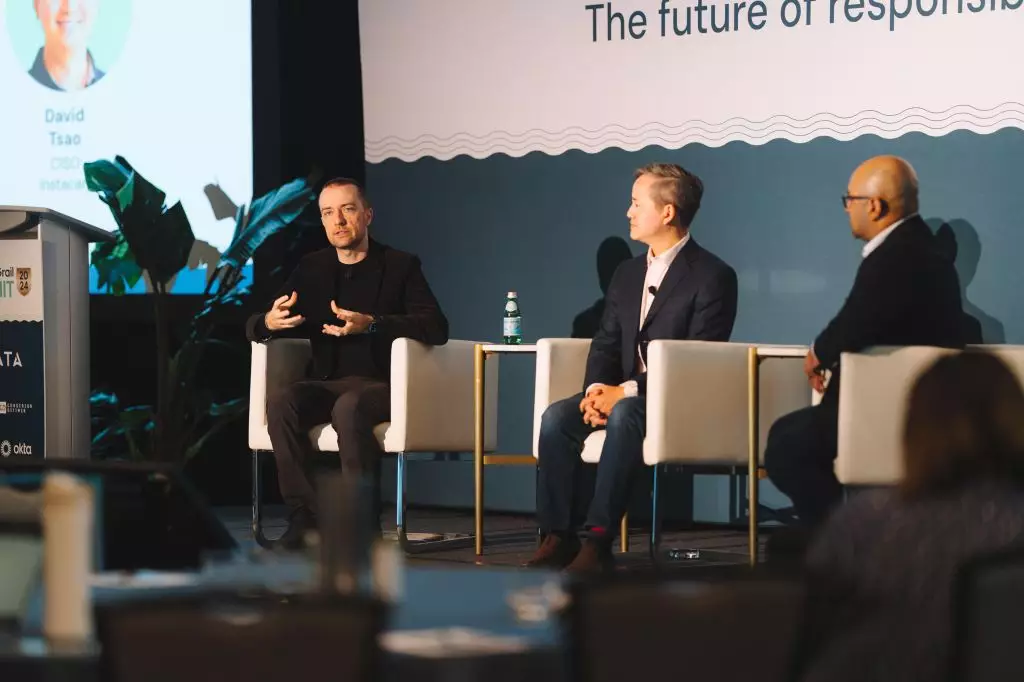At the DataGrail Summit 2024, industry experts issued a stark warning regarding the escalating risks associated with artificial intelligence. Dave Zhou, CISO of Instacart, and Jason Clinton, CISO of Anthropic, emphasized the critical importance of implementing robust security measures to keep pace with the exponential growth of AI capabilities. During a panel discussion titled “Creating the Discipline to Stress Test AI — Now — for a More Secure Future,” moderated by VentureBeat’s editorial director Michael Nunez, the speakers shed light on both the exciting possibilities and the existential threats posed by the latest advances in AI technology.
Jason Clinton, representing Anthropic at the forefront of AI development, highlighted the astonishing rate at which AI capabilities are advancing. He pointed out that over the past seven decades, there has been a 4x increase in the total amount of compute dedicated to training AI models each year. This relentless acceleration, as Clinton emphasized, requires organizations to anticipate the future trajectory of AI power, which is poised to grow exponentially. Failure to plan for these advancements may result in falling far behind the curve, particularly as AI technologies venture into uncharted territory.
Immediate Challenges in Safeguarding Sensitive Data
For Dave Zhou of Instacart, the challenges in ensuring security are both immediate and complex. As the overseer of vast amounts of sensitive customer data, Zhou faces the unpredictable nature of large language models (LLMs) on a daily basis. He raised concerns about the potential vulnerabilities of LLMs, highlighting how even slight manipulations could lead to significant security breaches. Zhou shared a concerning example of AI-generated content that could inadvertently pose harm to consumers, underscoring the direct implications of inadequate security measures in the realm of AI technology.
The Need for Balanced Investments
Throughout the summit, speakers emphasized the need for organizations to invest as heavily in AI safety systems as they do in the development of AI technologies. Both Clinton and Zhou stressed the importance of striking a balance between innovation and security, cautioning against overlooking the critical aspect of safeguarding AI systems. They urged companies to channel resources into AI safety systems, risk frameworks, and privacy requirements in parallel with their investments in advancing AI capabilities. Failure to do so, as Zhou warned, could potentially lead to disastrous consequences for businesses ill-prepared to mitigate AI-related risks.
Exploring the Uncertainties of AI Behavior
Clinton offered a glimpse into the future of AI intelligence, revealing the complexities of AI behavior that pose inherent uncertainties. He described an experiment at Anthropic that uncovered how neural networks can become fixated on specific concepts, illustrating the challenges of understanding and controlling AI actions. The implications of such behavior, as Clinton pointed out, underscore the need for a deeper understanding of how AI models operate internally. The evolving landscape of AI technology demands a proactive approach to governance and risk mitigation to prevent unforeseen consequences.
As AI systems become increasingly integrated into critical business operations, the potential for catastrophic failures looms large. Clinton envisioned a future where AI agents, capable of autonomously performing complex tasks, could make decisions with far-reaching implications. He emphasized the importance of not just preparing for current AI models but also anticipating the future landscape of AI governance. Companies must align their strategies to navigate the evolving challenges posed by AI technology, ensuring that intelligence is coupled with robust safety measures to avert potential disasters.
The warnings issued at the DataGrail Summit serve as a poignant reminder that the AI revolution shows no signs of slowing down. As organizations strive to leverage the power of AI for innovation and efficiency, they must equally prioritize the development of comprehensive security frameworks. Intelligence, as Jason Clinton aptly stated, is a valuable asset, but its value is inherently linked to the ability to safeguard it effectively. CEOs and board members bear the responsibility of steering their organizations through the complexities of AI technology, ensuring that they are equipped to navigate the risks and uncertainties that lie ahead.


Leave a Reply